Mumbai, formerly known as Bombay is not just the financial, entertainment and commercial capital of India, but also an important city to the state of Maharashtra allowing the state to churn more money every single day. Nestled on the west coast of the country facing the Arabian Sea, the city has an estimated population of more than 20 million and the numbers grow rapidly each year making it one of the most populous urban regions in the world. People from all corners of the country visit Mumbai to explore it and to make some money that would offer them a chance to lift their lifestyle. The pressure is immense and therefore most residents here have to be on their toes at all times. Hours of commuting across the city, traffic jams, professional commitments, irritating bosses, nagging wives and girlfriends, job insecurities, financial woes and a lot more adds up to the lifestyle making life insanely hectic and stressful. To meet the demands of this hyper-active and not-a-second-to-waste lifestyle, locals need a break – a food break, to rejuvenate, to bust their stress, to have a conversation with colleagues over a cafeteria table and to pamper their taste buds.
While there are many restaurants and cafes that have mushroomed over the city, there is one army of men that still beats all restaurants and cafes and performs exceptionally, as they have been doing it for decades – The Dabbawallahs. Okay, Mumbai residents by now must have realized where this post is heading, but for my international readers let me elaborate it. The word ‘dabba-wallahs’ literally means ‘the lunch box-delivery man’. Although, many of the upcoming restaurants and delis do have their delivery guys who can do quick deliveries, no matter wherever your office or residence is, but these dabbawallahs are in their own league. No matter what the climate is, no matter what goes wrong, riots, traffic jams, rush hour problems, they deliver food on time and are as sure as the rain.
So, how did it all began? In 1890 when Mumbai was Bombay, a rapidly growing metropolis (it still is) various communities from across the country migrated to Bombay for work. However, there were very few restaurants and canteens around the city that would cater to the ever growing demands of the people flocking to the city. Many of them would slog for the day without any meal. On the other hand, different communities that come from different parts of India had different preferences and tastes and were not really satisfied with the limited canteen meals available. Mahadeo Bhavaji Bacche, a migrant from the northern part of Maharashtra envisioned the underlying opportunity, not just to provide better food to the working class, but to make a business out of it. He quickly gathered few men from the villages to start this food business that offers home-made food at an affordable price. The food delivery business continued to expand even after his death and in 1968 got registered as Mumbai Tiffin Box Supplier’s Association.
So, what’s the USP of this army of food delivery men? So far, they seem like any other delivery food guys who take orders and deliver the food on time to the assigned location. Well, back in 1900s, Bombay was not a highly advanced city, so these dabbawallahs would make use of bicycles to collect dabbas (lunch boxes) from worker’s home or tiffin service locations. So for instance, if you hire them, they can come to your home, pick up the lunch box from your home and deliver it to your office at lunch time. Similarly, if you are not cooking at home and have hired a tiffin service they can pick up the food from your tiffin service guy and deliver it to your office at noon. They also return to your office, pick up your empty tiffin box and deliver it at your home or tiffin service office.
Of course, now that again does not sound like a big thing in the world. So, how about this? These dabbawallahs do all this without any computers, paper work or any supply chain management system that most restaurants and cafes follow. These guys pickup and deliver more than quarter of a million lunch boxes every afternoon without a single piece of paper work. The most unbelievable part about their management system is that they make one mistake in every 16 million transactions. The secret behind this is a coding system that they invented more than 100 years ago that they still follow meticulously day-after-day and their system has never failed.
Apart from the coding system, these dabbawallahs also follow a strict schedule that they will never break. Although, they are not highly educated (many of them haven’t even cleared their school education), but they perform like a clock, in sync with their schedule. While they do use bicycles, they also make use of the suburban railway trains which is their aggregation point. They also make use of handcarts that they push manually in rain or scorching sun to ensure you get your food on time, every afternoon. Their trademark white caps and white clothes are instantly recognizable in the crowd and even the police do not interfere in their process.
Today, these guys together run an association that has a market turnover of Rs. 360 million annually ($5.6 million). Every lunch box man earns around Rs. 8000/- per month ($125 per month). There are around 5000 dabbawallahs that move around quarter of a million lunch boxes every day. They normally charge around Rs. 500 for monthly delivery service which is ($7.8 per month). Every lunch box changes hands six times to reach its destination, but the process is complete without any error. They do not use fuel-powered vehicles so their cost on fuel or gas is zero. The organization has been rated by Forbes as one of the efficient food delivery system in the world. ABC has already produced a documentary on them and Prince Charles visited them personally when he visited India. Surprisingly, he had to re-schedule his timing according to their schedule, since their job does not allow much flexibility. The dabbawallah organization has also been certified with ISO 9001:2000 by the Joint Accreditation System of Australia and New Zealand.
These dabbawallahs also give lectures at various business management schools. In 2005, they lectured at the Indian Institute of Management (Ahmedabad) from a management perspective of logistics. In 2010, Harvard Business School added the case study to their compendium equaling their service with Six Sigma or better with a low cost and simple operating system. These guys are also into Guinness World Record books as in 2011; Prakash Baly Bacche carried 3 rectangular wooden crates on his head at one time (each crate can accommodate around 30-50 lunch boxes). The annual growth rate of this business is 5% which is remarkable considering that they are competing the best logistics and supply chain management systems from top restaurants and cafes across the city.
With 100% customer satisfaction they are truly an integral part of the city with a never dying spirit, hard work and efficiency that is second to none.
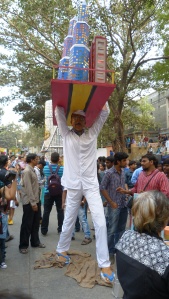
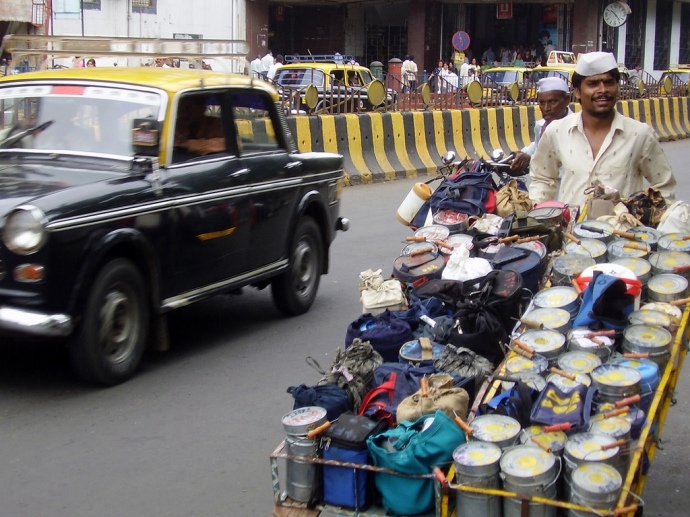
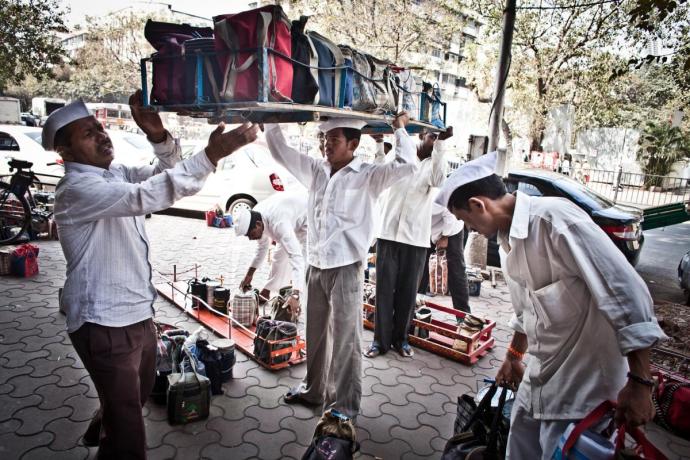
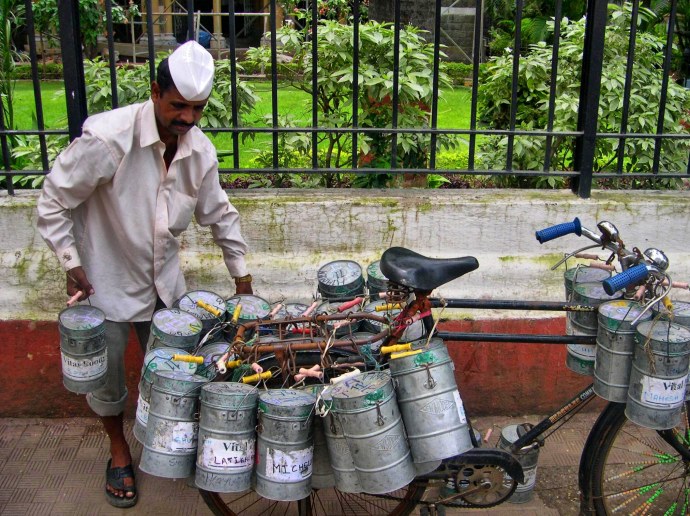

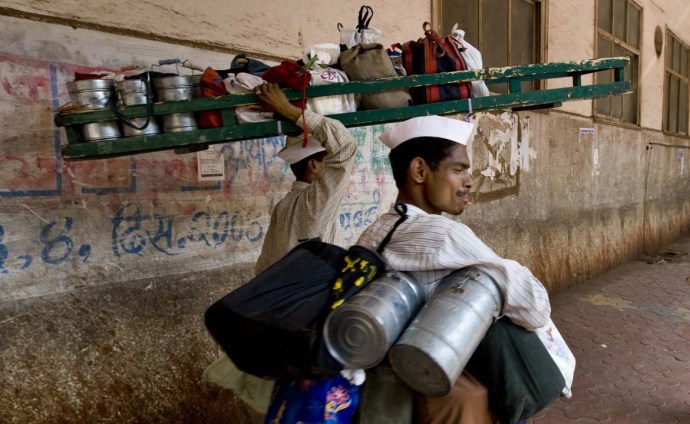
5 comments
That is incredible Shsrukh. I’ve never heard of this association or service. I’m not surprised that they can be so efficient but to have such a record in the climate you’ve described is amazing.
Not many in India or in the state itself know about them. They deliver on time using public transport like trains and bicycles and handcarts. I sometimes see them walking or cycling out in the summer afternoon with so many lunch boxes dangling on the handle and rear of the cycle. Simply Incredible. This is why I chose them to start off my series.
It’s a great topic.
Wow. Your posts always offer interesting information that I would otherwise have never known. These fellows work hard for their earnings. I can only imagine the comfort it brings someone in their day to see those white shirts approaching, knowing lunch break has arrived!
Thanks Cheryl. Yeah when you see them you can be sure you won’t stay hungry for long.